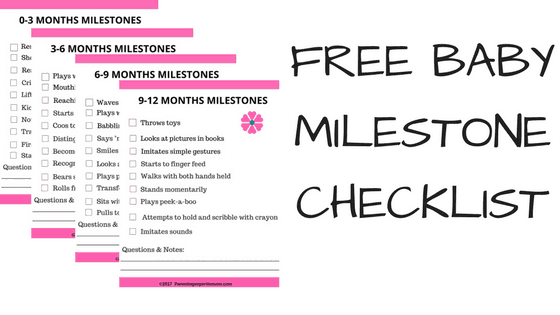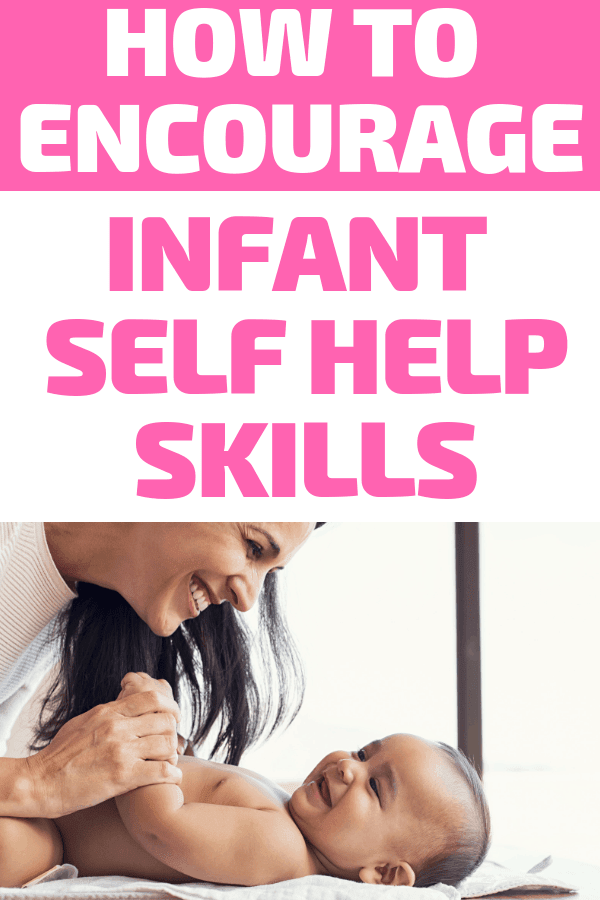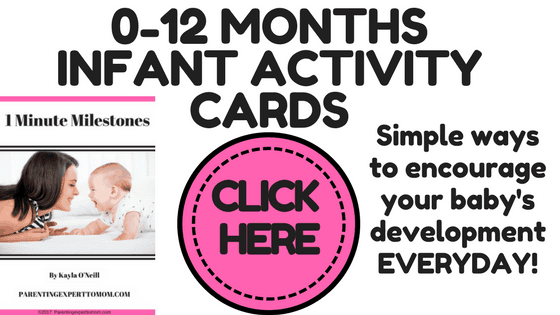Infant Self help skills for babies 0-6 months include those needed for your little one to someday become independent in their daily routines and activities.
It may be hard to picture your baby feeding themselves, but they are already working on the skills to become independent in those routines. In this post we will go over EVERYTHING you need to know about 0-6 month self help skills for infants and simple ways to encourage them.
All children develop differently so know that if your baby is not doing the exact same things as another, that is ok.
However, if you are concerned about your little one’s development always seek out the Early Intervention program in your area for a free screening or evaluation.
In this post I will give you information about what self help skills look like and how to encourage these skills in babies from birth to three months.

(This post may contain affiliate links. To read our full disclosure policy click here.)
0-3 Months Self Help Skills Include:
Breastfeeding and Bottle Feeding
In those first days of your baby’s life eating is one of the most important skills they gain!
Nursing or drinking from a bottle requires a lot of coordination for them as they need to breathe, suck, and swallow in order to take down milk or formula without issues.
If nursing, make sure to get into a spot that is comfortable so that you and your baby are relaxed.
Skin to skin contact is also a great way to encourage feeding and increase milk supply. When bottle feeding, make sure that you have the right flow of nipple so that formula or milk does not come out too fast or too slow so your baby can eat efficiently.
If you are having difficulties with feeding seek out a lactation consultant or your pediatrician for help.

Sleeping
When your baby is first born they sleep a lot.
They cycle into different modes of sleep in which some are lighter and some are deeper. You may notice in the lighter cycles of sleep your baby may move or change their facial expression.
As your baby grows their sleep will change as well.
Newborn sleep looks a lot different then a baby that is older.
Their sleep intervals will get longer as they settle into their sleeping,eating, and awake time routines.
Click HERE for more tips on sleep!
Bringing Hands to Mouth
You baby is working on discovering their new favorite toy: Hands! Their little fingers provide them with oral stimulation and your baby may also use them to soothe ( this is a wonderful skill to have).
At the newborn stage their hands will most likely be balled up into fists most of the time.
By month three you will see them begin to remain in a more open position.
As they become more aware of their limbs and hands they will start to bring them up to their face to look a them and also explore them by putting their fingers in their mouth.
This important skill is what leads babies to be more independent in their feeding routines.
Click here if you are wondering when do babies hold their own bottles?
RELATED POST: 0-6 Month Motor Development
How Can I Encourage 0-3 Months Self Help Skills?
Watch Your Baby’s Cues
Get to know your little one by snuggling them close and watching for their cues. Babies will tell you what they need, but we have to pay attention so that you can meet their needs appropriately.
Are they rubbing their eyes? This may mean that they are ready for a nap or some rest. Are they crying?
Check their diaper to see if they need a change. (Did you know crying is part of language development as well?)
Do you see smiles or hear cooing?
This means your baby is enjoying something or someone nearby. Listen closely to their different cries to hear what they are telling you. Watch how they respond to what is going on their environment so that you can help them feel comfortable and safe.
Some settings may be too overstimulating for your baby.
Dimming lights can help make the environment a little calmer.

Encourage Your Baby
Encourage safe sleep habits by always laying your baby down on their back to sleep.
According to the American Academy of Pediatrics, babies should sleep in the same room as their parents but on a separate sleep surface such as a crib or a bassinet for the first 6 months.
There should be no loose blankets or stuffed animals in the crib. Consider using a sleep sack (this is the one we use) to keep you little one warm at night.
Need more information about the latest sleep recommendations and strategies for infants? Zero to Three provides these here!
You can encourage your little one to start exploring their hands by gently giving bringing them up near their mouth or face. If you feel resistance, then stop. They may need a little more time to figure it out how to find their own hands.
You can also try out these newborn play activities to encourage development as well.
Snuggle and Cuddle Your Baby
You can not spoil a baby that is this young!
They need to know that you are there to protect them and help them meet their needs.
Cuddling with your little one is one of the best ways for parents and babies to bond. It also allows you lots of time to observe them so that you will start to notice their cues.
RELATED POST: 0-6 Month Cognitive Development
3-6 MONTHS SELF HELP SKILLS INCLUDE:
Sleeps Longer Stretches
You may notice that your baby is starting to sleep longer stretches at night. They should be getting about 10-12 hours total but still waking up at times is normal.
According to Baby Sleep Central your baby’s awake time should be about 1.25 to 2 hours at a time from 4-6 months with naps during the day that total up to about 3.5 to 5 hours. Click here if you would like to learn more about awake/nap times for your baby.
Bringing Hands to Mouth
Your baby is starting to use their hands to play and explore. They are now able to bring their hands to their mouth while holding an object or toy.
This skill lets baby explore new objects with their mouths which is how they take in a lot of information.
Providing them with simple textured toys (like this one) that they can explore is a great way to encourage this skill. This is a great way to develop your baby’s fine motor skills as well!
Placing Hands on Bottle
Your baby is showing interest in helping feed themselves.
You may notice that they are bringing their hands up to the bottle while they are feeding.
Eventually they will gain the strength to hold the bottle on their own. You can start working on this skill by gently bringing their hands up to the bottle during feeding times.
If they resist, follow their cues. They may not be ready to concentrate on holding the bottle and may need to focus on coordinating their feeding. Keep trying periodically to introduce this skill.
RELATED POST: 0-6 Month Social Development
How Can I encourage 3-6 Month Self Help Skills?
Play With Your Baby
Playing with your baby is a wonderful way to encourage the muscles and coordination they need to gain for skills like reaching for the bottle. Encourage two-handed play with simple toys (like these) during diaper changes or floor time.
Let your baby explore different textures with their hands which will also encourage reaching and grabbing. Let them feel the roughness of a washcloth or a soft silk scarf to bring awareness to those little hands.
Use tummy time to encourage skills as well. You can find out how much tummy time your baby needs here.
Hold Your Baby
Hold your baby during feeding times and do not prop the bottle so that they eat alone. Avoid leaving the bottle in a crib or pack and play as well.
Feeding time is a great time to connect and be social with your baby.
You can work on showing them how to hold their own bottle by gently placing their hands on it. As they become stronger you give them less help and let them hold it on their own.
If you are breastfeeding, it is also a great time to connect with your little one. I know how tempting it can be to watch TV or look at your cell phone during feeding times.
Try to take the time to watch your baby while they feed as they grow up so fast! Watch for their cues to let you know when to switch sides or change positions to make them more comfortable.
RELATED POST: 0-6 Month Language Development
Establish Routines
In order to promote good sleep habits, establish a bedtime routine. Reading (simple books like these work great) and singing and perfect activities to include into your routine.
These are both great ways to encourage cognitive development as well. Make sure to give your baby time to calm down and fall asleep. Always follow safe sleep practices.
If you liked what you read then make sure to sign up for the FREE Baby Milestone Tracker so you have check off all the new milestones your baby is doing (great for putting in the baby book as well!)

CLICK HERE TO GRAB YOUR CHECKLIST
Related Posts You Will Enjoy
Top Toys For Baby’s First Year
5 Fun Bath Toys to Encourage Development
Everything You Need to Know About Social Skills 6-9 Months


Kayla O’Neill has a master’s degree in education as well as a bachelor’s degree in special education with an emphasis in early childhood education. She has been working as a developmental therapist with babies and toddlers in early intervention since 2012. She is also a mom with two young children.
